上海牛津英语7AUnit2-课文讲解与练习综述
七年级英语7A Unit1-Unit5主要知识点复习上海牛津版知识精讲

七年级英语7A Unit1-Unit5主要知识点复习上海牛津版【本讲教育信息】一、教学内容:7A Unit1-Unit5主要知识点复习二、知识总结与归纳Module 1 (Unit 1- Unit 3)1. invite sb. to do邀请某人做某事He has invited us to stay with his family in Beijing.他已经邀请我们去北京和他的家人呆在一起。
2. travel to 旅行去……We usually travel to some small cities.我们经常去一些小城市旅游。
3. more interesting 更加有趣more beautiful 更加美丽more exciting 更加激动人心4. talk to 和……谈话Let’s talk to Mum and Kitty.让我们去和妈妈还有基蒂谈谈。
5. travel agent 旅行经纪人I’ll get some brochures from the travel agent.我会从旅行经纪人那里拿到一些宣传手册。
6. How long does it take to…? ……花费多少时间?It takes (time) to do ………花费(时间)How long does it take to get to Beijing?到北京花费多少时间?It takes about 2 and a half hours to get there.到北京大概要花费两个半小时。
7. come back 回来We’re going to come back at 8.我们将会在8点回来。
8. at the end of (August) 在(八月)底We will start school at the end of August.我们将会在八月底开学。
9. thank sb. for 为……谢某人Thank you for your water. 谢谢你的水。
牛津英语7A Unit 2Let's play sports 重点用法梳理
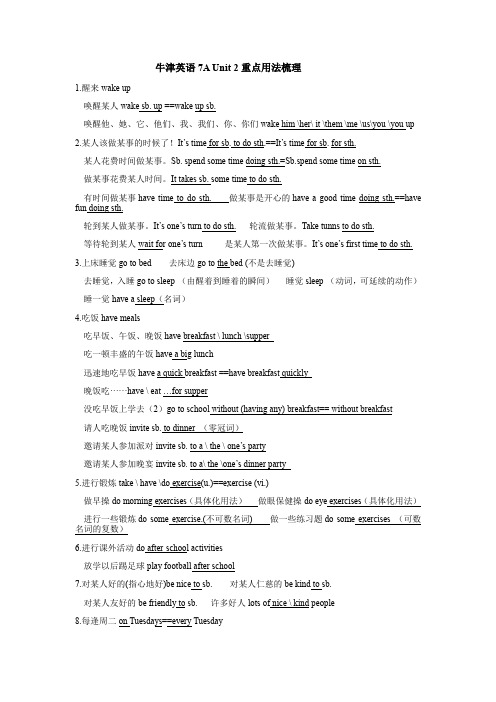
牛津英语7A Unit 2重点用法梳理1.醒来wake up唤醒某人wake sb. up ==wake up sb.唤醒他、她、它、他们、我、我们、你、你们wake him \her\ it \them \me \us\you \you up 2.某人该做某事的时候了!It’s time for sb. to do sth.==It’s time for sb. for sth.某人花费时间做某事。
Sb. spend some time doing sth.=Sb.spend some time on sth.做某事花费某人时间。
It takes sb. some time to do sth.有时间做某事have time to do sth. 做某事是开心的have a good time doing sth.==have fun doing sth.轮到某人做某事。
It’s one’s turn to do sth. 轮流做某事。
Take tunns to do sth.等待轮到某人wait fo r one’s turn 是某人第一次做某事。
It’s one’s first time to do sth.3.上床睡觉go to bed 去床边go to the bed (不是去睡觉)去睡觉,入睡go to sleep (由醒着到睡着的瞬间)睡觉sleep (动词,可延续的动作)睡一觉have a sleep(名词)4.吃饭have meals吃早饭、午饭、晚饭have breakfast \ lunch \supper吃一顿丰盛的午饭have a big lunch迅速地吃早饭have a quick breakfast ==have breakfast quickly晚饭吃······have \ eat …for supper没吃早饭上学去(2)go to school without (having any) breakfast== without breakfast请人吃晚饭invite sb. to dinner (零冠词)邀请某人参加派对invite sb. to a \ the \ one’s party邀请某人参加晚宴invite sb. to a\ the \one’s dinner party5.进行锻炼take \ have \do exercise(u.)==exercise (vi.)做早操do morning exercises(具体化用法)做眼保健操do eye exercises(具体化用法)进行一些锻炼do some exercise.(不可数名词) 做一些练习题do some exercises (可数名词的复数)6.进行课外活动do after-school activities放学以后踢足球play football after school7.对某人好的(指心地好)be nice to sb. 对某人仁慈的be kind to sb.对某人友好的be friendly to sb. 许多好人lots of nice \ kind people8.每逢周二on Tuesdays==every Tuesday在周二on Tuesday 在周二上午、下午、晚上on Tuesday morning \ afternoon \ evening 每周二的上午on Tuesday mornings ==every Tuesday morning9.她是一个很棒的游泳者。
牛津译林版英语7A Unit2Let's play sports 单元知识解析
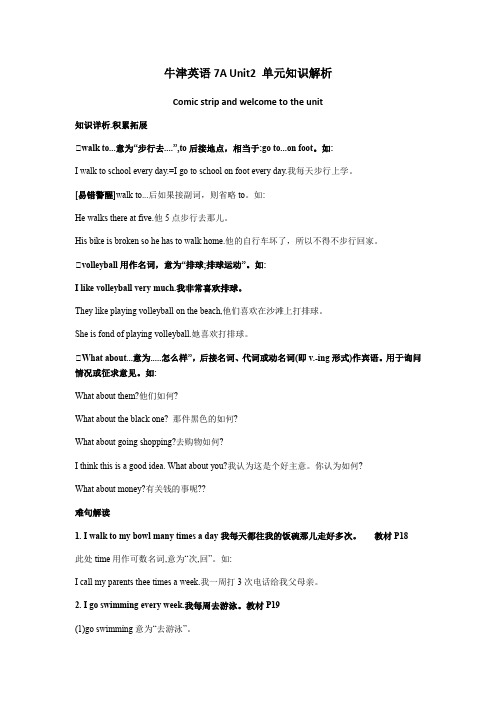
牛津英语7A Unit2 单元知识解析Comic strip and welcome to the unit知识详析.积累拓展➊walk to...意为“步行去....”,to后接地点,相当于:go to...on foot。
如:I walk to school every day.=I go to school on foot every day.我每天步行上学。
[易错警醒]walk to...后如果接副词,则省略to。
如:He walks there at five.他5点步行去那儿。
His bike is broken so he has to walk home.他的自行车坏了,所以不得不步行回家。
❷volleyball用作名词,意为“排球;排球运动”。
如:I like volleyball very much.我非常喜欢排球。
They like playing volleyball on the beach,他们喜欢在沙滩上打排球。
She is fond of playing volleyball.她喜欢打排球。
❸What about...意为.....怎么样”,后接名词、代词或动名词(即v.-ing形式)作宾语。
用于询问情况或征求意见。
如:What about them?他们如何?What about the black one? 那件黑色的如何?What about going shopping?去购物如何?I think this is a good idea. What about you?我认为这是个好主意。
你认为如何?What about money?有关钱的事呢??难句解读1. I walk to my bowl many times a day我每天都往我的饭碗那儿走好多次。
教材P18此处time用作可数名词,意为“次,回”。
如:I call my parents thee times a week.我一周打3次电话给我父母亲。
上海牛津英语7AUnit2课文讲解与练习综述

Unit 2 Our animal friends 一、重点词组与句型1. an SPCA officer 一位动物保护协会的官员2. prevent –prevention 防止,阻止3. prevent animals from danger / save animals from danger / keep animals from danger 保护动物远离危险4. at the SPCA 在动物保护协会5. cruel –cruelty 残忍6. be cruel to sb. 对...残忍7. leave these puppies in the street 把这些小狗遗弃在街上8. have no food or water 没有食物和水9. be hungry and thirsty 又饥又渴10. keep one as your pet 收留一只作为宠物11. prefer A to B = like A better than B比起B来更喜欢 A12. prefer doing A to doing B 比起做B来更喜欢做 A13. prefer –preferred 更喜欢prefer …= like…better 更喜欢…14. the yellow and brown one 黄褐相间的15. be in danger 处于险境16. be dangerous to 对...危险17. care for = take care of =look after 照顾,照看18. help homeless animals 帮助无家可归的动物19. give them a booklet to read 给他们一些小册子看20. Feed him/her 3-4 times every day. 每天喂他/她3、4次。
21. special dog food for puppies 特殊的小狗粮22. Give him/her a bowl of water to drink.给他/她一碗水喝。
上海牛津版英语七年级上册七上7AUnit2U2同步讲义教案

学员编号:年级:课时数:学员姓名:辅导科目:英语学科教师:授课类型T Unit2(牛津7上)同步梳理教学目标1、使学生能够基本掌握牛津7年级上册Unit1中的基础词汇及重要句型;星级★★★授课日期及时段T同步-U2基础知识梳理(建议时间:5分钟)你喜欢什么动物?在放学回家的马路上看到流浪的、被人遗弃的小动物时你是怎么做的呢?一、词汇Words (建议20分钟,老师边讲边要求学员记住单词,此环节结束之后要求学员记住80%)1. officer n. 官员;高级官员【词性转换】office n. 办公室e.g. A police officer came to help when our car broke down on the way.我们的汽车在路上出了毛病,一位警官帮了我们的忙。
2. society n. 社团;协会【词性转换】social adj. 协会的;社会的e.g. the Chemical Society of China 中国化学学会3. prevention n. 预防;防止;防范【词性转换】prevent v. 预防;防止e.g. Prevention is better than cure. 预防胜于治疗。
批注:prevent和protect,很多孩子分辨不清楚,还应该让孩子注意protect的名词形式是protection。
4. cruelty n.残酷【词性转换】cruel adj. 残酷的;悲惨的e.g. cruelty to children 虐待儿童5.someone pron. 某人【近义词】somebody pron. 某人;有人e.g. Someone wants to talk with you. 有人想和你谈话。
6. puppy n. 小狗;幼犬【提示】dog一般用来指“成年狗”或表示狗的总称;puppy特指小狗,复数形式为puppies7. thirsty adj. 口渴的【词性转换】thirst n. 口渴e.g. I often feel thirsty when it’s very hot. 天热时,我常感到口渴。
2019沪教牛津版七年级上册Unit2讲义(无)语文

英语初一专题系列之Unit 2 Daily life课前检测⋯ and⋯ 2.把某物送给某人3.once or twice a week4.on foot5.过得快乐6.放学后7.教某人做某事 8.in the middle of9.参加 10.by doing sth11.How often 12.junior high school13 乘公共汽车14.在⋯尾端15 起床 16.play the pinao1.Listen to a boy talking about his weekend.【考点聚焦】Talk about 意为“〞,后边既可以接人,也可以接物。
Let’s talk about the problem.The students are talking about the new teacher.[易混辨析]talk of 提及,谈起多指谈起某事Talk to/with 与⋯⋯发言后边平常跟人做宾语,但 talkwith 更重视双方的发言Talk of the devil and he comes.Our teacher is talking to/with our monitor.2.辨析That’s right .All right 与That’s all right[考点聚焦]①That’s right 。
〔对别人所说的话表示必然〕②All right ;;。
③That’s all right ;〔客气话和对不起的回应〕— The book is very interesting.— That’s right.3.Which of these things do you do once or twice a week?第 1 页[考点聚焦]①助动词do/does/did后边要跟动词原形 ;②每周一两次注意:在英语中,表示一次用“once,〞两次用“twice,〞表示三次也许三次以上就用“基数词+times〔〞time在这里是可数名词,表示次数,需要加“s〕〞如: once a week, twice a week, three〔four/ five 〕⋯ times a weekI play computer games once or twice a week.She 〔watch〕TV 〔一周两次〕1.— Would you please help me do the dishes,John〔? 2021 吉林长春中考〕—,but I’m busy cleaning my room.’re welcome ’m sorryC.It doesn’t matter ’s right2.— The programme is very popular.— .We all like it.’s right B.Not at allC.It doesn’t matter ’re welcome’s discuss the problem after school.A.talk to C.talk aboutC.know aboutD.think about4.他一周上一两次网。
牛津英语知识点归纳系列 7A Unit2
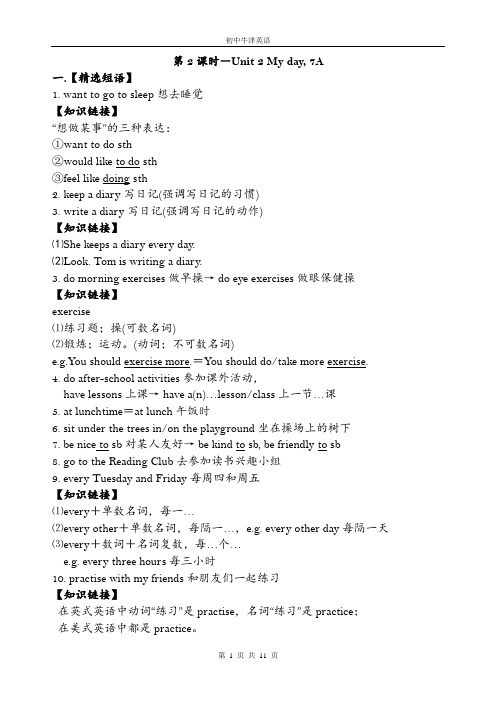
第2课时-Unit 2 My day, 7A一.【精选短语】1. want to go to sleep想去睡觉【知识链接】“想做某事”的三种表达:①want to do sth②would like to do sth③feel like doing sth2.keep a diary写日记(强调写日记的习惯)3.write a diary写日记(强调写日记的动作)【知识链接】⑴She keeps a diary every day.⑵Look. Tom is writing a diary.3. do morning exercises做早操→ do eye exercises做眼保健操【知识链接】exercise⑴练习题;操(可数名词)⑵锻炼;运动。
(动词;不可数名词)e.g.You should exercise more.=You should do/take more exercise.4.do after-school activities参加课外活动,have lessons上课→have a(n)…lesson/class上一节…课5.at lunchtime=at lunch午饭时6. sit under the trees in/on the playground坐在操场上的树下7. be nice to sb对某人友好→ be kind to sb, be friendly to sb8. go to the Reading Club去参加读书兴趣小组9. every Tuesday and Friday每周四和周五【知识链接】⑴every+单数名词,每一…⑵every other+单数名词,每隔一…,e.g. every other day每隔一天⑶every+数词+名词复数,每…个…e.g. every three hours每三小时10. practise with my friends和朋友们一起练习【知识链接】在英式英语中动词“练习”是practise,名词“练习”是practice;在美式英语中都是practice。
沪教牛津版七年级上册Unit2-Daily-life-单元归纳总结练习

沪教牛津版七年级上册U n i t2-D a i l y-l i f e-单元归纳总结练习(总5页)-CAL-FENGHAI.-(YICAI)-Company One1-CAL-本页仅作为文档封面,使用请直接删除Unit 2 Daily life (2016.12.20)班级:姓名:家长签名:一、重点短语once or twice a week 一周一两次 on foot 步行learn about 了解,知道 from...to... 从......到......take part in 参加 have a good time玩得开心,过得愉快after-school activities课外活动 talk about谈论,交谈between...and... 在......与......之间 arrive at/in 到达help sb. with sth. 帮助某人做某事 on the way to... 去......的路上around the world 世界各地 one of the best... 最好的......之一同义词1. seldom = not often2. break = a short rest3. ring = make a sound4. end = stop5. together = with each other6. daily = everyday二、重点句子1.I love going to school.我喜欢去上学。
2.My school is close to my home, so I always go to school on foot.我的学校靠近我家,所以我总是走路上学。
3.My favourite subject is Geography.我最喜欢的科目是地理。
4.I enjoy learning about different places in the world.我喜欢了解世界不同的地方。
牛津译林版7A Unit 2 知识点总结 (共50张PPT)

Unit 2 Let’s play sports
“希望…” hope that …. e.g. I hope that you will be better soon.
e.g. I hope that she will be a writer. I hope her to be a writer. ×
dream n. “梦想,幻想” e.g. I have a nice dream this evening
Unit2 Let’s play sports! Welcome to the unit
Language points:
1.Do you like any sports? 你喜欢一些体育运动吗? some用于肯定句中,any用于否定句和疑问句中, 当any用于肯定句中时,与“一些”无关,表示 “任何”。 e.g. You can borrow any book from the library.
make + sb. + do sth. e.g. You make me laugh.
make + sb. + sth. e.g. We make Cui Jia our monitor.
9. Li Hua wants to play in the next World Cup.
want 与would like同义, 其后接名词、动词不定式
6. Many people like him.
初中英语 牛津上海七年级上册Unit2 Our animal friends知识点及语法点讲解
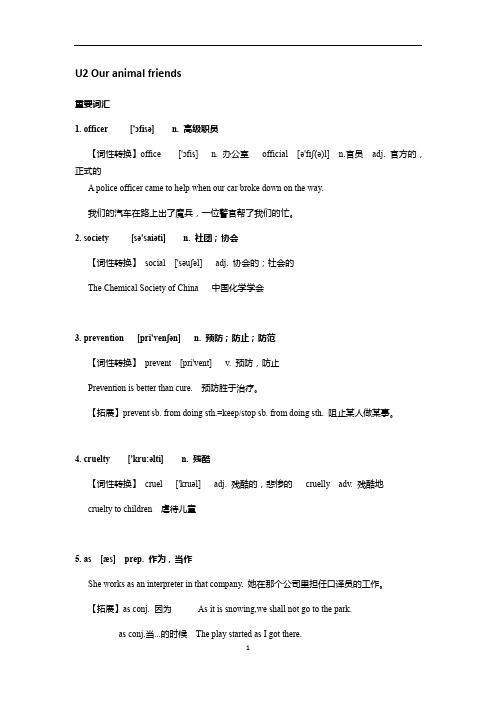
U2 Our animal friends重要词汇1. officer ['ɔfisə] n. 高级职员【词性转换】office ['ɔfis] n. 办公室official [ə'fɪʃ(ə)l] n.官员adj. 官方的,正式的A police officer came to help when our car broke down on the way.我们的汽车在路上出了魔兵,一位警官帮了我们的忙。
2. society [sə'saiəti] n. 社团;协会【词性转换】social ['səuʃəl] adj. 协会的;社会的The Chemical Society of China 中国化学学会3. prevention [pri'venʃən] n. 预防;防止;防范【词性转换】prevent [pri'vent] v. 预防,防止Prevention is better than cure. 预防胜于治疗。
【拓展】prevent sb. from doing sth.=keep/stop sb. from doing sth. 阻止某人做某事。
4. cruelty ['kru:əlti] n. 残酷【词性转换】cruel ['kruəl] adj. 残酷的,悲惨的cruelly adv. 残酷地cruelty to children 虐待儿童5. as [æs] prep. 作为,当作She works as an interpreter in that company. 她在那个公司里担任口译员的工作。
【拓展】as conj. 因为As it is snowing,we shall not go to the park.as conj.当...的时候The play started as I got there.6. prefer [pri'fə:] v. 更喜欢【用法】prefer A rather than B 宁愿A而不要Bprefer A to B 喜欢A而不喜欢B;喜欢A胜过B (sth./doing sth.)=would rather do than do.=like A better than B=prefer to do rather than doprefer to do sth. 更喜欢做某事prefer doing sth. 宁愿做某事— Do you prefer coffee or tea? 你喜欢咖啡还是茶?— I prefer coffee to tea. 我喜欢咖啡胜过茶。
沪教牛津版七年级上册Unit2讲义(无答案)

沪教牛津版七年级上册Unit2讲义(无答案)3.Which of these things do you do once or twice a week?[考点聚焦]①助动词do/does/did后面要跟动词原形;②每周一两次注意:在英语中,表示一次用“once”,两次用“twice”,表示三次或者三次以上就用“基数词+times”(time在这里是可数名词,表示次数,需要加“s”)如:once a week,twice a week, three(four/ five…)times a weekI play computer games once or twice a week.She (watch)TV (一周两次)1.—Would you please help me do the dishes,John?(2019吉林长春中考)—,but I’m busy cleaning my room.A.You’re welcomeB.I’m sorryC.It doesn’t matterD.That’s right2.—The programme is very popular.—.We all like it.A.That’s rightB.Not at allC.It doesn’t matterD.You’re welcome3.Let’s discuss the problem after school.A.talk to C.talk aboutC.know aboutD.think about4.他一周上一两次网。
He surfs the Internet a week.5.I go swimming twice a week.(对划线部分提问)do you go swimming?4.how often do you watch television.[考点聚焦]①how often 多久一次,询问动作发生的频率(上节学过的特殊疑问句,现在再来复习)how often 多久一次回答:once a week;three times amonthhow soon 多久以后回答:in an hour;in two weekshow long 多长时间(还可以用于对物体长度提问) 回答:three days ;four weekshow far 多远 回答:ten miles,three minutes ’ walk—How often do you exercise?— (一周四次)②watch television= watch TV 看电视[辨析]watch 、look 、see 、read watch “观看、注视”,全神贯注地看看电视、比赛、实验、表演等Watch TV/game/match look “看、望”,指动作的过程,表示有意识地看,但不强调看的结果,后加介词“at”Look at 看 look for 寻找 Look after 照顾 see “看”,强调动作的结果,但不一定是有意识地看See a movie /doctor read主要指看书、看报、看杂志 Read newspaper 看报纸5.Classes start at 8 am, and I am seldom late. at 在这里表示时间,“在” 如: at half past two 在两点半at (后+时间)在具体的钟点(后+地点)小地方用“at”at 8 am ;Arrive at schoolin (后+时间)指上午、下午或晚上;年月或季节(后+地点)大地方用“in”In the morning ;In January ;in spring ;Arrive in Beijingon 具体日期,在星期几前, 在节日前,某天的上下午 On May 21st ;on Monday On New Year’s Dayon the morning of May 2nd7.I enjoy learning about different places in the world.①Different:不同的。
牛津7A_Unit2_教学要求,知识点讲解和练习 无

7A Unit 2 My day【单元学习重点和要求】一、语音1.单词重读` cartoon `favourite `principal `badminton`practise `swimming `playground `modeltech`nology mu`seum ac`tivities infor`mation2.不完全爆破a(c)tivities frien(d)ship the Grea(t) Wall bi(g) trees the firs(t) prize 3.句子重音和语调Can I `borrow your ↗pen?Do you `have your ↗books?May I `watch ↗TV?Is she `tall and ↗slim?Are you ↗busy?Do you `like ↗music?二、词汇1.单词assembly activities playground snack tuck principal practise swimmer favourite model badminton cartoon information technology museum swimming organizing price trip slim 2.词组it‟s time for+名词是做某事的时间了,该做某事了get up 起床after-school activities 课外活动have assembly 开晨会have lessons 上课eat breakfast/lunch/supper 吃早/中/晚餐do one‟s homework做家庭作业watch TV 看电视go to bed 上床睡觉keep a diary 记日记a day at school 在学校的一天lots of 许多;大量have fun 娱乐,乐趣;开心more than 多于;超过twice a week 一星期两次swimming club 游泳俱乐部read comic books 看连环漫画书have (no) time to do sth. 有(没有)时间做某事chat with sb 和某人聊天/闲谈go swimming 去游泳I would like to+动词原形愿意干某事;想要干某事from...to…从……到……look forward to…期盼;盼望turn on 打开(电灯、电视、收音机等)Here it is! 给你!三、日常用语Is it time for breakfast? 是吃早饭的时候了吗?What are you going to do today? 今天你打算干什么?Please e-mail me soon! 请尽快给我发电子邮件!We are in Class 1, Grade 7. 我们在七年级一班。
牛津英语 七年级上 7A Unit2 Grammar课件
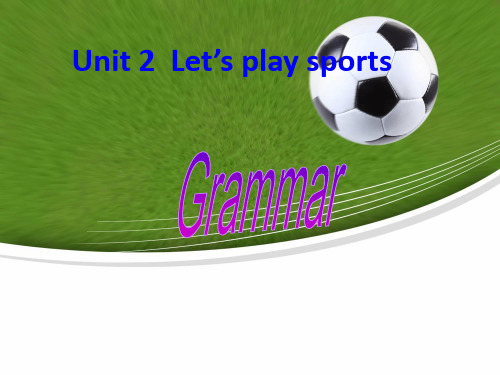
何时使用一般现在时?
行为动词的一般现在时可用于以下情况: 1. 表示经常性、习惯性的动作用一般现在时。
e.g. I often play tennis at weekends. 我经常在周末打网球。
2. 不受时限的客观事实。e.g. Cats eat fish. 3. 表示现在的能力、特征、喜好等。
4. _D_o_e_s_ Simon like walking? _N_o_,_h__e_d_o_e_s_n_’_t.____
5. _D_o_ Simon and Daniel love drawing? _N_o_,_t_h_e_y__d_o_n_’_t.__
主语是第三人称单数时,在疑问 句及其回答中助动词用does,其他 人称助动词用do。
e.g. I like playing volleyball. 我喜欢打排球。
Do you like playing volleyball?
Fill in the blanks according to the given verbs.
( dance go like play watch) 1. I _li_k_e playing volleyball. 2. Kitty _d_a_n_c_e_s very well. 3. Amy _g_o_e_s_ swimming every week. 4. Simon often p_l_a_y_sfootball with his friends. 5. Daniel sometimes _w_a_t_c_h_e_s ball games on TV.
1. 直接在动词后面加 s
read reads
牛津英语 七年级上 7A Unit2Reading2课件

name and age club comes from
looks hobby
lives in
dream
Favourite player
name and age club looks
comes from livejoy doing sth. make him happy hope sb can/ will do sth come true
Homework
•Review what we’ve learned today. •Preview Grammar •Finish the exercises in the workbook.
What is his name? How old is he?
What club is he in? He is in Huanghe Football Club.
I hope my parents can be always healthy. I hope Shu YiCheng will learn English well.
I hope I will travel to Venice one day. I hope to travel to Venice one day.
What does Li Hua enjoy doing? He enjoys listening to music.
Why? Because it makes him happy.
The film makes them happy. Watching the film makes them happy.
Where does Li Hua come from? He comes from Guangdong. He is from Guangdong.
牛津英语7A_Unit_2_全部教案

牛津初中英语教学案牛津初中英语(7A)Unit 2 My Day第一课时Welcome to the unit设计的基本理念:根据新课标培养学生自主、合作、探究精神、突出语言使用水平培养的理念而设计。
课型:对话、句型操练课1、技能目标:培养学生灵活使用本课所学词汇、句型来表述日常活动的对话水平。
2、知识目标:①重点单词:fun, sleep, a.m, p.m, homework, model, make, newspaper, film, mum, should, right.②重点短语:wake up, go to sleep, have assembly,…③重点句型:I get up at 6 a.m every morning.When do you get up?When do you go to school?What do you do after school?3、情感目标:通过学习谈论日常安排和活动之后,学生能够为自己制定一个合理的学习和生活的日常活动安排表。
4、策略目标:通过日常生活时间来描述自己或他人的日常活动,并学习使用词汇。
5、文化意识目标:时间表达,逻辑思维,做事有条理,时间观点强,珍惜光阴。
课堂教学模式:一学一练一测和任务型教学课前准备:1、准备一个钟。
2、教师或学生画一些日常活动的图片。
3、教师制作日常生活和学习的表格。
4、让学生预习新单词。
教学过程:Step 1: Revision.Review the names of meals and the different activities presented on page 19. Divide the class into groups of four. Brainstorm the topic of daily life activities. Ask Ss to draw an activity if they do not know the word in English.Step 2: Presentation.Talk to Ss about daily routines and activities.Say: I get up at 6 a.m in the morning.When do you get up? etcStep 3: Ask Ss to sort their activities into different sections:Leisure — Sports — Eating — school.Teacher tells Ss to write down the day and time when they typically do these activities. As you go around the class, provide help with vocabulary.Step 4: Each group writes the four lists on the board. Ss can copy the activities they want to include in their diary.Step 5: Work in pairs to talk about their partner’s diary. You can use the following sentence patterns:a. When do you go to school /…/ ?b. Do you go to school by bus /…/ ?c. What do you do after school /…/ ?Step 6: Learn Vocabulary.a. P23 Go through Part A and read the words and phrases correctly. Attention to their pronunciation.b. Ss complete the task and check answers. Encourage Ss to memorize the collocations Part B.c. Let Ss go through Part B and explain the context. Ask Ss to do the task on their own, then check answers. Ss correct any mistakes and the teacher explains something if necessary.d. Divide the class into pairs. Let Ss read the conversation and get some pairs to act it out.Step 7: Practice — task.课堂教学任务。
牛津沪教版英语七年级上Unit 2辅导讲义

七年级上U2Can 的用法:1,表示能力(如体力和脑力方面),意为“能;会”等。
例如:Can you speak English? 你会讲英语吗?Can you play the piano? 你会弹钢琴吗?2. 表示请求或允许,多用在口语中,意为“可以;能”等。
用于疑问句中用来提出要求,用于否定句表示不允许。
例如:Can I help you? 我能帮助你吗?You can’t play basketball. 你不能玩篮球。
3. 表示可能。
Errors Presentation1,An Englishman who ____not speak Italian was once traveling in Italy.A) must B) could C) may D) might2,He ____the 9:20 train because he didn't leave home till 9:25.A) can reach B) could catch C) may not catch D) couldn't have caught3.Mr Wang ______ be in Nanjing now, he went to Beijing only this morning.A. mustn’tB. may notC. can’tD. needn’t4. –Who is the man over there? Is it Mr Li?--No, it ______ be him. Mr Li is much taller.A. musn’tB. may notC. can’tD. needn’t5. A computer ______ think for itself, it must be told what to do.A. can’tB. couldn’tC. may notD. might notContent of courses重点单词:1.officer [ˈɒfɪsə(r)] n. 军官,警官; 高级职员; v. 指挥; 统率;变形过去分词: officered 复数: officersEg.He served during peace-time as an intelligence officer in the Navy.他在和平时期担任海军情报官员。
2024-2025学年新版牛津译林版英语七年级上册Unit2+新版词汇表讲解

7A Unit 2 讲解jog/dʒɒg/vi.慢跑,慢步长跑( 尤指锻炼)n.慢跑(19)jogging --- go jogging go v-ingpaint /peɪnt/vi.&vt.用颜料画;在···上刷油漆n.绘画颜料;油漆(19)paintingoil paint 油漆;油画颜料;油性涂料paper-cutting/'peɪpə/ /'kʌtɪŋ/n.剪纸(19)all kinds of 各种各样的(19)kind – type / stylevary – variousfit/fit/adj.健康的(19)keep fit / healthyaround /ə'raʊnd/prep.围绕,环绕adv.到处,向各处(20)roundaround the world 全世界show sb around...turn aroundchange /tʃeɪn(d)ʒ/vt.使不同vi.&n.改变,变化(20)change one’s life 改变某人的生活change n. 找零exchange (students) 交换(生)li fe/laif/n.pl.li ves)个人生活;生命(20)all one’s lifethief(小偷),wife(妻子),wolf(狼),shelf(架子),knife(刀),half(半),leaf(树叶),life(生命),scarf(围巾)museum/mju:'ziəm/n.博物馆(20)thing/θɪŋ/n.东西(20)thingssomething, anything, nothing,everything*apart/ə'pɑːt/adv.分开(20)take apart拆卸,拆开 机器等)(20)fix/fiks/vt.修理;安装(20)mend: 通常指较简单的修复过程,一般不需要专门技术或特殊工具。
牛津英语7AUnit2period3PPT课件

Hello, my name is Millie.I study at…
Are there many students in your class?
Do you love them?Why?
Who is your best friend?
What do you often do?
Report 2
Millie’s activities at school
4. We must learn from e_a__c_h_o_t_h_e_r__.
5. The students always _h_a_v_e_a__g_o_o_d__t_im__e___ with their PE teacher.
6. My grandmother is _m_o_r_e__th_a_n_ seventy years old.
My school day starts at 8:00 a.m.. We do….
do morning exercises begin at 8:25
spend two hours doing…
go to the school library
practise after school
love swimming
I like reading. My favourite lesson is Chinese. My favourite teacher is Miss Zhao. She teaches us Chinese. I like football best. I like Monday because we have two Chinese classes on Monday. I always read Chinese books at the school library.
- 1、下载文档前请自行甄别文档内容的完整性,平台不提供额外的编辑、内容补充、找答案等附加服务。
- 2、"仅部分预览"的文档,不可在线预览部分如存在完整性等问题,可反馈申请退款(可完整预览的文档不适用该条件!)。
- 3、如文档侵犯您的权益,请联系客服反馈,我们会尽快为您处理(人工客服工作时间:9:00-18:30)。
Unit 2 Our animal friends 一、重点词组与句型1. an SPCA officer 一位动物保护协会的官员2. prevent –prevention 防止,阻止3. prevent animals from danger / save animals from danger / keep animals from danger 保护动物远离危险4. at the SPCA 在动物保护协会5. cruel –cruelty 残忍6. be cruel to sb. 对...残忍7. leave these puppies in the street 把这些小狗遗弃在街上8. have no food or water 没有食物和水9. be hungry and thirsty 又饥又渴10. keep one as your pet 收留一只作为宠物11. prefer A to B = like A better than B比起B来更喜欢A12. prefer doing A to doing B 比起做B来更喜欢做A13. prefer –preferred 更喜欢prefer …= like…better 更喜欢…14. the yellow and brown one 黄褐相间的15. be in danger 处于险境16. be dangerous to 对...危险17. care for = take care of =look after 照顾,照看18. help homeless animals 帮助无家可归的动物19. give them a booklet to read 给他们一些小册子看20. Feed him/her 3-4 times every day. 每天喂他/她3、4次。
21. special dog food for puppies 特殊的小狗粮22. Give him/her a bowl of water to drink.给他/她一碗水喝。
23. Give him/her hard dog biscuits to chew. 给他/她硬的狗饼干咀嚼。
24. Give him/her a basket to sleep in. 给他/她篮子睡。
25. Give him/her a blanket to keep him/her warm. 给他/她毯子保暖。
26. Hold him/her carefully with both hands. 用双手小心的抱他/她。
27. Take him/her to a park for a walk every day.每天带他/她去公园散步。
28. don’t need to do sth. / needn’t do sth. / don’t have to do sth. 不必做某事29. a kitten / a young cat 小猫30. be kind to sb. be unkind to sb.对…和蔼可亲对…不友善31. help sb. do sth. / help sb. with sth. 帮助某人做某事32. promise (not) to do sth. 承诺(不)做某事33. clinics for sick animals 收治生病动物的诊所34. the vets in the clinics 诊所的兽医35. play with kittens 和小猫玩36. junior members of the SPCA 动物保护协会的初级会员37. help sb. by doing sth. 通过做某事来帮助某人38. collect old blankets 收集旧毯子39. raise money for …为…筹钱40. be useful to ... 对…有用41. live in a cave 住在洞穴里42. hunt for food 猎食43. life guards 救生员44. guard the houses 守卫房屋45. a blind man 一位盲人46. in different ways 用不同的方法47. on the farm 在农场48. cross the road safely 安全地过马路49. find missing people 找到失踪的人50. catch a thief 抓小偷catch thieves 抓捕小偷51. make a display 制作展板52. save v. –safe a. –safely ad. –safety n. 挽救v. 安全的a. 安全地ad. 安全n.53. the SPCA = the Society for the Preventionof Cruelty to Animals 动物保护协会54. take care of = look after=care for 照顾55. keep warm 保暖56. play with a puppy 和小狗玩57. need to do sth. 需要去做某事否定句don’t need to do59. be unkind to sb 对…不友好be kind/friendly to sb 对…友好60. promise to do sth 承诺做某事promise not to do sth 许诺不做某事61.keep people safe from danger 保护人们62.cross the road safely 安全地过马路cross v. across prep. 介词walk across= cross63.take good care of 好好照顾= look after well64.in many different ways 在各种不同方面65.the police 警方66. Do you know what the SPCA is?你知道什么是SPCA么?67. keep one puppy as your pet养一只小狗作为宠物68. like best = favourite 最喜欢69. prefer the black one更喜欢黑色的一只70. a basket to sleep in一个睡觉的篮子71. keep …. warm 保持….温暖72. hold …..carefully with both hands用双手小心地抱着73. buy sth for sb 为某人买某物74.sometimes 有时候75. save animals from danger拯救动物免受危险76.help sb do sth 帮助某人做某事77. must do sth. 必须做某事78. sick animals 生病的动物79. keep people safe from danger保护人们安全免受危险80. hunt animals for food猎杀动物获取食物81. should do 应该做某事82. on their farms 在他们的农场里83. bring sth to sb 把某物带给某人84. look after sb well = take good care of sb 很好的照料某人85. in many different ways在许多不同的方面86. office –officer 办公室–官员87. cruelty –cruel 残忍–残忍的88. love –lovely 喜爱- 可爱的89. save –safe –safely –safety拯救–安全的–安全地–安全感叹句结构:1.△What引导的感叹句的中心词是名词。
该名词前常有形容词修饰,句中的主语和谓语一般可省去。
1)What a cold day (it is)! 今天天气真冷啊!2)What an old house (it is)! 这间房子真老啊!3)What nice air (it is)! 空气真好啊!4)What delicious food (it is) !多好吃的食物啊!5)What happy children (they are)!孩子们多快乐啊!注:What结构中的名词若为单数可数名词,要用不定冠词a/an,而不用the;如句1)2);若为复数或不可数名词(常见不可数名词:work, weather, fun, food等),则不用冠词,如句3)4)5).△How引导的感叹句的中心词是形容词或副词。
★★★句型为:How+形容词/副词+(主语+谓语)!例如:6)How cold (it is )today! 今天天气真冷啊!7)How happy (the children are)! 孩子们真愉快啊!8)How hard (the student works)! 这个学生学习多努力啊!9)How well (Mr Zhao teaches )!赵先生教得多好啊!10)How happily (the boys are playing)!那些男孩们玩得多开心啊!注:how 结构中主语如果是名词,常常前面要用定冠词the(比较第5和7两句);6)7)两句是感叹形容词,8)9)10)是感叹副词。
感叹句巧解:感叹句要看后面,即看形容词后的东东,1) 若形容词后紧跟可数名词单数,就用what a/an;是不可数名词或可数名词复数,只用what。
2)若形容词后后紧跟a/an/the/my/your/this/that/Tom’s等等乱七八糟的东西,想都不用想,直接用how就OK了。
如:例句1:What a good boy he is! 他是个多么好的男孩啊!/ \形容词单数名词例句2:What good boys they are! 他们是多么好的男孩啊!/ \形容词复数名词例句3:What cold weather it is! 多么冷的天气啊!/ \形容词不可数名词例句4:How good the boy is! 这男孩多好啊!/ \形容词乱糟糟★★★若没有形容词,而出现副词或是句子,直接用how.例:How well he plays the guitar! 他吉他弹得多好啊!/副词(what不可以修饰副词,看到副词直接用how)How time flies!How fast Liu Xiang runs打油诗一首: 感叹句往后看形容词后是名单就用what a或what an形后若是不可数或名复数只用what就可以形容词后乱糟糟只写how就OK了感叹句练习题一、选词填空。
